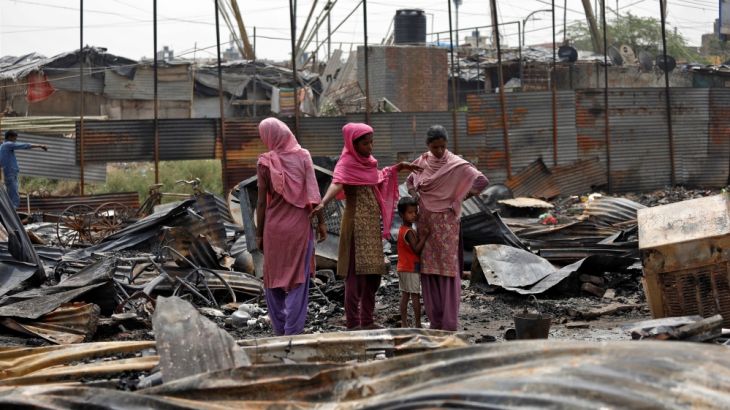India criticised for deporting seven Rohingya men to Myanmar
India has deported its first group of Rohingya, raising fears of further repatriations.

Rights groups and activists have slammed the Indian government for deporting seven Rohingya men to Myanmar, a controversial decision that was also backed by the country’s top court.
On Thursday, India’s Supreme Court allowed the first deportations of Rohingya after it rejected a last-minute plea by defence lawyer Prashant Bhushan to allow them to remain in the country as they feared reprisals in Myanmar.
Keep reading
list of 4 itemsConflict, climate, corruption drive Southeast Asia people trafficking: UN
Bodies of three Rohingya found as Indonesia ends rescue for capsized boat
How is renewed violence in Myanmar affecting the Rohingya?
“Even the country of their origin has accepted them as its citizens,” the court said, adding that it would not interfere with the government’s decision.
“The order of the top court is appalling, both in law and for lacking humanitarian empathy,” Ravi Nair, who works at South Asia Human Rights Documentation Centre in the capital New Delhi, told Al Jazeera.
The seven men, arrested in 2012 for entering India illegally, were bussed to the border town of Moreh in Manipur state, where they were handed over to Myanmar border guards on Thursday.
Nair said this first instance of the repatriation of Rohingya may trigger “a spate of further deportations”.
“Generally, there’s apathy for refugees. Whether it were Iranian refugees fleeing the Shah of Iran, or Sudanese and Somali refugees, or Afghan refugees fleeing Soviet invasion and the Taliban. Similarly, the Indian public could not be bothered about the fate of these Rohingyas who fled deadly violence,” he said.
Amnesty India also criticised the government’s decision and accused it had been conducting “a relentless smear campaign” against the Rohingya community in India for over two years.
“This decision sets a dangerous precedent for all asylum seekers and refugees in India,” said Aakar Patel, an official of the group, asking the government to work with the United Nations High Commissioner for Refugees so as not to renege on human rights commitments.
‘International legal obligation’
A UN human rights official said the forcible return of the Rohingya violates international law.
“Given the ethnic identity of the men, this is a flagrant denial of their right to protection and could amount to refoulement,” said the UN Special Rapporteur on racism, Tendayi Achiume.
“The Indian Government has an international legal obligation to fully acknowledge the institutionalised discrimination, persecution, hate and gross human rights violations these people have faced in their country of origin and provide them the necessary protection,” Achiume said in a statement.
Defence lawyer Bhushan said the government should treat the Rohingya as refugees and not as illegal migrants and have a representative of the UN High Commissioner for Refugees visit and talk to them so that they were not deported under duress.
An estimated 40,000 Rohingya, a mostly Muslim minority, live in India after having fled persecution in Buddhist-majority Myanmar over the years.
The Indian Government has an international legal obligation to fully acknowledge the institutionalised discrimination, persecution, hate and gross human rights violations these people have faced in their country of origin and provide them the necessary protection
Prime Minister Narendra Modi’s Hindu nationalist government has described undocumented Rohingya immigrants as posing a national security threat and asked state governments last year to identify and deport them.
More than 700,000 Rohingya fled to Bangladesh after an army crackdown in Myanmar a year ago.
UN officials have described the Myanmar military’s action as ethnic cleansing. In a report published in August, the UN called for Myanmar officials to face genocide charges over their campaign against the Muslim minority.
Myanmar has denied the charge, saying its military had launched counterinsurgency operations after attacks on security forces by Rohingya militants in August last year.
Myanmar stripped the Rohingya of their citizenship in 1982, rendering the minority community stateless.
Zeenat Saberin contributed to this report from New Delhi